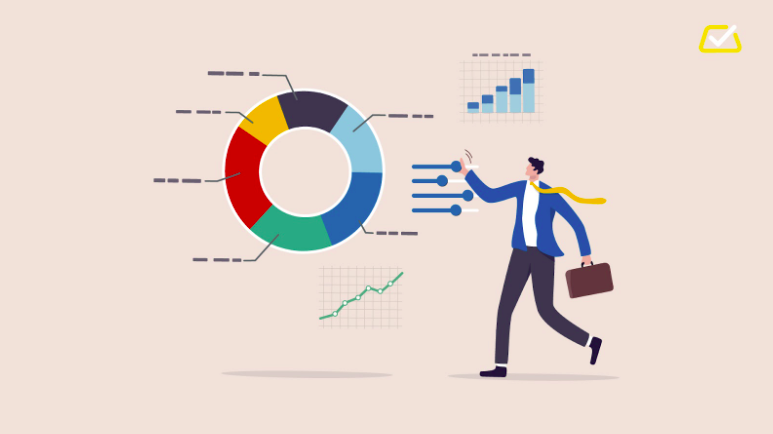8 Reasons Why You Should Be a Money-conscious Muslim Woman

As Muslim women, we are given countless blessings from Allah SWT. One of the many blessings is that according to the Shariah, our menfolk have been made responsible for protecting us and providing financially for us.
When we are young, our fathers have the responsibility to financially care for us. And when we are married, our husbands take on this responsibility. This can be one of the reasons why many Muslim women feel that being money-savvy is a male domain that we need not concern ourselves with.
However, it is increasingly common for women to have an income or assets now, and to be economically active in various ways. Therefore, sooner or later, we will inevitably have to make decisions regarding money in our lives. When we do, we learn that as Muslims, wealth is a blessing entrusted to us by Allah SWT, and we are its guardians and custodians.
So, what does being a custodian of wealth exactly mean? This means we must use our wealth carefully and responsibly, because we will be accountable for it in front of Allah on the Day of Judgement. To that end, we must invest time into acquiring the knowledge and skills required to be responsible custodians. So let me give you eight benefits of being a money-savvy Muslim woman.
1. Being money-conscious helps serve your needs, your family and community better
As a Muslim woman, being financially capable can help your family finances flourish, making you better able to serve Allah SWT and benefit society. It can also help you to be a better homemaker if you are managing the family finances as a wife.
As wives, we are entrusted with our husband’s wealth on a daily basis.
The Prophet ﷺ told us: “A woman is a guardian over the household of her husband and his children and shall be questioned about them (as to how she managed the household and brought up the children)” (Muslim). This includes the husband’s wealth.
One of the greatest examples of a financially astute Muslim woman is the Prophet ﷺ’s beloved wife, Khadijah RA. Khadijah RA was a caring wife, devoted mother, and a wealthy businesswoman who funded the cause of Islam.
Her wealth was instrumental in the early development of the Muslim community, and her generosity was a reflection of her faith. Khadijah is an inspiration to Muslims around the world, showing how fruitful it can be for a righteous woman to have wealth.
2. Being money-conscious helps to save for something special
Perhaps you’d like to take your family abroad regularly, or maybe there’s something long-term you dream of being able to achieve or pay for.
Being able to budget and developing the habit of saving regularly can help you take care of your family’s needs, while still having enough left over to put aside for that dream or ambition that you have. Even better, if you can develop the habit of investing in the long term, then not only will you be saving that money, but it could also potentially grow over time.
3. Being money-conscious allows you to know what your responsibilities and entitlements are
Zakat is one of the five pillars of Islam. Do you know if you have to pay Zakat on your jewellery or savings? Or what kinds of assets are Zakatable and how much wealth do you have to have before Zakat is obligatory upon you? These are things, as a Muslim, you are personally responsible for finding out about.
If you are getting married, then being money-savvy can help you to understand what your financial rights and responsibilities will be once you are married. For example, what exactly is mahr? How much can your mahr be? Can you ask your husband for a monthly allowance? Can you take money from your husband without his permission? These are all things you’ll need to know about as a Muslim woman.
Moreover, there may be certain government-assigned benefits you are entitled to, which you don’t want to miss out on.
Upon the passing of a loved one, you will need to know what the Islamic rights of inheritance are.
The Prophet ﷺ advised us about writing a will, saying: "It is not permissible for any Muslim who has something to will to stay for two nights without having his last will and testament written and kept ready with him." (Bukhari)
If you own any significant amount of wealth, or even intellectual property, then writing a will and ensuring your wealth and assets are smoothly passed on to your own heirs will be essential. Although there are prescribed portions of inheritance in Islam, one also has much leeway in apportioning up to a third of one’s wealth to causes and people who might not otherwise benefit from one’s wealth through prescribed inheritance.
If you have ambitions to achieve things that may seem out of reach, such as a PhD or starting a business, being aware of the grants and scholarships available out there could provide the support that you need to get started.
4. Being money-conscious helps one to avoid Haram transactions and benefit from Halal¹ ones
Being money-savvy allows us to avoid the dangers of falling into sin and displeasing Allah SWT. We live in a time where haram elements such as Riba (interest) are normalised. For example, there are various agreements or online payments such as ‘buy now, pay later’ (that sneakily include interest) that you might casually enter into but are toxic to your wealth.
Allah tells us in the Qur’an: "Allah will deprive Riba of all blessing, but will give increase for deeds of charity" (Quran 2:276).
We all want to maximise the blessing or Barakah in our wealth, because it is the Barakah that actually makes the wealth fruitful and beneficial.
Haram sources of income are things we want to avoid consuming, as they attract Allah SWT’s wrath and remove the blessings from our wealth.
Jabir ibn Abdullah reported that Allah's Messenger cursed the one who accepts Riba and its payer, and one who records it, and the two witnesses; and he said: “They are all equal” (Muslim)
You cannot avoid Haram transactions if you are unaware of them. So although it isn’t necessary for you to be an Islamic finance expert, it’s also not advisable to be ignorant of the sorts of transactions you enter into every day.
Halal transactions on the other hand and profit-seeking in a permissible way, attract blessings to our wealth as does charity and spending upon Halal things.
5. Being money-conscious can make one more charitable in the way of Allah SWT
Giving in charity from our husband’s wealth, in a responsible way is a great means of reward for us as women. It is ultimately an investment into our bank account in the life hereafter.
Aisha RA narrated that the Prophet ﷺ said: "When a woman gives in charity from her husband's wealth without wasting the property of her husband, she will get a reward for it, and her husband too will get a reward for what he earned.” (Bukhari)
Giving from our own personal wealth is also highly encouraged. Did you know that the Mothers of the Believers RA were given the option of being given a piece of land or a regular stipend by the Caliph ‘Umar bin al-Khattab RA? Many of them chose the stipend because they wanted to be able to give regular charity from their own wealth!
In fact, Mother of the Believers Zainab bint Jahsh RA, was praised for being the most charitable of the wives of the Prophet ﷺ, as Aisha RA reported:
“Some of the wives of the Prophet ﷺ, said to him, ‘Which of us will be the quickest to meet you?’ The Prophet ﷺ said, ‘The one with the longest hand.’They measured their hands with sticks and Sawdah had the longest of them, yet Zaynab was the first to die. Then, we knew that the length of her hand meant her charity. She was the quickest to meet him and she loved to give charity.” (Bukhari)
In fact, Zaynab RA used to sew and make things with her own hands, just to be able to sell these items, generate her own income and give that in charity. (Muslim)
The Prophet ﷺ pointedly told women to increase in giving charity.
Ibn Abbas RA narrated that after the Eid prayer, the Prophet ﷺ. went towards the women accompanied by the companion Bilal RA. “...He preached [to] them and ordered them to give in charity. And some (amongst the women) started giving their forearm bangles and earrings (in charity).” (Bukhari)
If you are a righteous woman, who strives to do good, being smart about your finances can help you do even more good and be even more generous with your wealth.
Abdullah ibn Mas’ud RA reported: The Prophet ﷺ said, “There is no envy but in two cases: a person whom Allah has given wealth and he spends it rightly, and a person to whom Allah has given wisdom and he judges and teaches with it.” (Bukhari)
6. Being money-conscious helps avoid wasting or naively squandering money
Knowing how to manage money, to budget and save, can help you to avoid wasting money. Impulse-buying and addictive shopping behaviours can be harmful habits that are avoidable with the right planning. The Qur’an encourages moderation in expenditure:
"And [they are] those who, when they spend, do so not excessively or sparingly but are ever, between that, justly moderate" [Quran 25:67]
We want to avoid being taken advantage of or investing money into things without due diligence. I personally learnt this the hard way when, as a young newly-wed, I invested half of my Mahr into a new startup company without really knowing what I should have been checking before investing - I never heard from that company again. Ouch!
7. Being money-conscious can save you from debt and absolute poverty
Debt can be burdensome and managing it, painful.
Anas ibn Malik RA reported: The Prophet ﷺ, said, “O Allah, I seek refuge in You from anxiety, sorrow, disability, laziness, cowardice, miserliness, the burdens of debt, and the repression of men.” (Bukhari)
Being money-savvy can help you avoid debt or to manage paying it off in a better way.
The Prophet ﷺ sought refuge in Allah from poverty and becoming needy. He encouraged us to be givers of charity, not those who receive charity.
Abdullah ibn Umar RA reported: The Messenger of Allah ﷺ said, “The upper hand is better than the lower hand. The upper hand is one that gives and the lower hand is one that takes.” (Bukhari)
Being money savvy can help you avoid debt and to be able to do without borrowing or if you have already got debts, it can help you manage them better. None of us want to fall into poverty and have to resort to asking for hand-outs.
The Prophet ﷺ is reported to have said: “By him in whose hand is my soul, if one of you were to carry a bundle of firewood on his back and sell it, that would be better for him than begging a man who may or may not give him anything.” (Muslim)
8. Being money-conscious can attract Barakah to your wealth and increase it
Since Rizq (provision) is from Allah, we want to seek all the means that will add Barakah (blessing) to our wealth and avoid everything that saps our provision of Barakah. Sometimes those are things that are not directly related to wealth. For example, did you know that keeping the ties of family kinship is a means to increasing your Rizq?
Anas ibn Malik RA reported: The Messenger of Allah ﷺ said, “Whoever is pleased to have his provision expanded and his life span extended, let him keep good relations with his family.” (Bukhari)
Did you know that going on Hajj and ‘Umrah are a means to expanding Rizq? Or that repenting to Allah SWT and increasingly saying ‘Astaghfirullah’ (I seek forgiveness from Allah) is a means to increasing your wealth?
Allah tells us that the Prophet Nuh AS told people this in the Qur’an: "I said (to them): 'Ask forgiveness from your Lord; Verily, He is Oft-Forgiving; He will send rain to you in abundance; And give you increase in wealth and children, and bestow on you gardens and bestow on you rivers.' " [Qur’an 71:10-12]
What being money-conscious doesn’t mean
Being conscious about money does not however mean that we should become obsessed, greedy, attached or overly-controlling of money. It shouldn’t mean increasing in miserliness (bukhl) or anxiety (hamm).
The Prophet ﷺ is reported to have said, “Wretched is the slave of gold, silver, fine clothes, and garments. If he is given, he is pleased, but if he is not given, he is displeased.” (Bukhari)
In fact, we should aim to make giving and spending our wealth and the wealth we are responsible for, something we do with greater confidence and tawakkul (reliance upon Allah). As the great scholar of Islam, Ibn al-Qayyim (rh) said in his book, Madarij al-Salikeen:
“When there is money in your hand and not in your heart, it will not harm you even if it is a lot; and when it is in your heart, it will harm you even if there is none in your hands.”
Summary
Being money-smart and proactive is essential for any woman who has wealth or helps to manage it in her household. From managing everyday expenses to saving for long-term goals and fulfilling religious obligations, adopting a money-savvy mindset can help us avoid debt, reduce waste, and maximise our blessings. It can help us to understand our responsibilities and entitlements, prepare for the future and for our dreams.
By making informed financial decisions and investing in halal income streams, we as Muslim women can help our family finances flourish while also contributing to the betterment of our communities.
Wahed allows Muslims to invest their money in a diversified, low-cost and most importantly shariah-compliant way. We do this by investing your money into different investments that are matched to you, and that you feel comfortable with. Just choose your desired risk level and we’ll handle the rest.
Since 2017, Wahed has already helped 300,000 Muslims across the world to grow their wealth in a way that is in line with their faith and values.
You can join them and get started here.
1. The term 'Halal' denotes that it is permitted and follows Islamic law
Risk Warning: Equity investments are not readily realisable and involve risks, including loss of capital, illiquidity, lack of dividends and dilution, and it should be done only as part of a diversified portfolio. Investments of this type are only for investors who understand these risks. You will only be able to invest in the company once you have met our conditions for becoming a registered member.
Please visit www.wahed.com/uk/ventures/risk for our full risk warning.
Risk Warning: As with any investment, a Wahed Invest Ltd investment puts your money at risk, as the value of your investment can go down as well as up. The tax treatment of your investment will depend on your individual circumstances and may change in the future. If you are unsure about whether investing is right for you, please seek expert financial advice.
Please visit www.wahed.com for our full terms and conditions
Maydan Capital Limited, trading as WahedX, is registered in England and Wales (Company No. 13451691), registered office: 87-89 Baker Street, London, W1U 6RJ, UK. Maydan Capital Ltd (FRN: 963613) is an appointed representative of Wahed Invest Ltd (FRN: 833225), an authorised and regulated firm by the Financial Conduct Authority.Wahed Invest Ltd. is registered in England and Wales (Company No. 10829012), registered office: 87-89 Baker Street, London, W1U 6RJ, UK and is authorised and regulated by the Financial Conduct Authority: FRN 833225.
Subscribe For More Islamic Finance Content
As with any investment, a Wahed Invest Ltd investment puts your money at risk, as the value of your investment can go down as well as up. The tax treatment of your investment will depend on your individual circumstances and may change in the future. If you are unsure about whether investing is right for you, please seek expert financial advice.
Wahed Invest LLC (Wahed) is a US Securities and Exchange Commission (SEC) registered investment advisor. Wahed Invest provides brokerage services to its clients through its brokerage partner Apex Clearing Corporation, a member of NYSE - FINRA - SIPC and regulated by the SEC and the Commodity Futures Trading Commission. Registration does not imply a certain level of skill or training. Wahed does not intend to offer or solicit anyone to buy or sell securities in jurisdictions where Wahed is not registered or a region where an investment practice like this would be contrary to the laws or regulations. Any returns generated in the past do not guarantee future returns. All securities involve some risk and may result in loss. Any performance displayed in the advertisements or graphics on this site are for illustrative performances only.
Disclaimer: Wahed Technologies Sdn Bhd ("Wahed") is a Digital Investment Manager (DIM) licensee issued by Securities Commission Malaysia (eCMSL/ A0359/2019). It is part of Wahed Inc. Wahed is authorized to conduct a fund management business that incorporates innovative technologies into automated portfolio management services offered to clients under a license issued pursuant to Schedule 2 of the Capital Markets Services Act 2007. All investments involve risks, including the possibility of losing the money you invest, and the track record does not guarantee future performance. The history of returns, expected returns, and probability projections is provided for informational and illustrative purposes, and may not reflect actual future performance. Wahed is not responsible for liability for your trading and investment decisions. It should not be assumed that the methods, techniques, or indicators presented in this product will be profitable, or will not result in losses. The previous results of any trading system published by Wahed, through the Website or otherwise, do not indicate future returns by that system, and do not indicate future returns that will be realized by you.
Wahed Invest Limited is regulated by ADGM’s Financial Services Regulatory Authority (“FSRA”) as an Islamic Financial Business with Financial Services Permission for Shari’a Compliant Regulated Activities of Managing Assets and Arranging Custody [Financial Permission No. 220065]. Our ADGM Registered No. is 000004971.
Wahed assumes no obligation to provide notifications of changes in any factors that could affect the information provided. This information should not be relied upon by the reader as research or investment advice regarding any issuer or security in particular. Any strategies discussed are strictly for illustrative and educational purposes and should not be construed as a recommendation to purchase or sell, or an offer to sell or a solicitation of an offer to buy any security. Furthermore, the information presented may not take into consideration commissions, tax implications, or other transactional costs, which may significantly affect the economic consequences of a given strategy or investment decision. This information is not intended as a recommendation to invest in any particular asset class or strategy or as a promise of future performance.
There is no guarantee that any investment strategy will work under all market conditions or is suitable for all investors. Each investor should evaluate their ability to invest long term, especially during periods of downturn in the market. Investors should not substitute these materials for professional services and should seek advice from an independent advisor before acting on any information presented. Any links to third-party websites are provided strictly as a courtesy. We make no representation as to the completeness or accuracy of information provided at these websites nor do we endorse the content and information contained on those sites. When you access one of these websites, you are leaving our website and assume total responsibility and risk for your use of the third-party websites.








